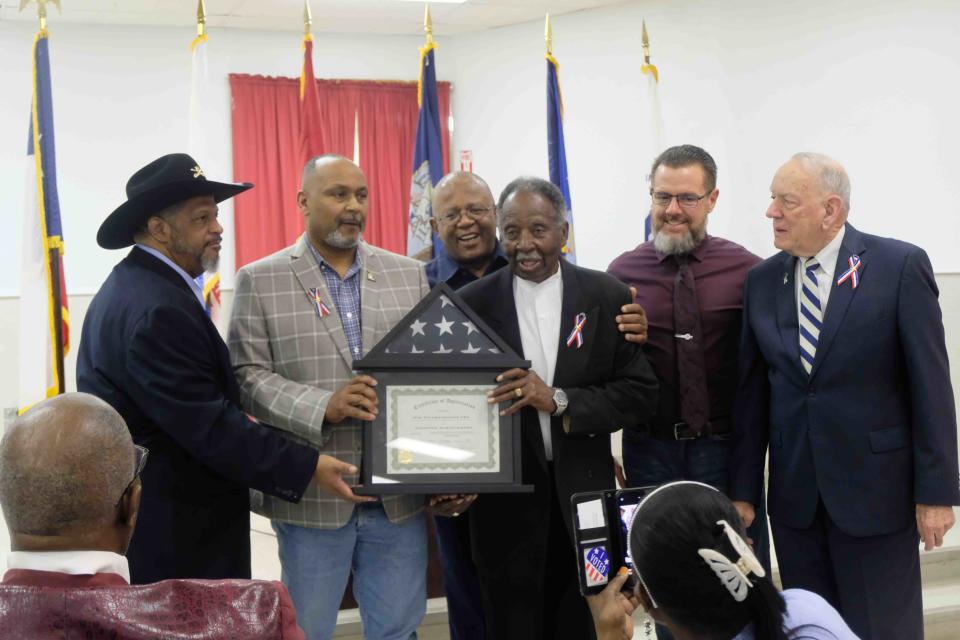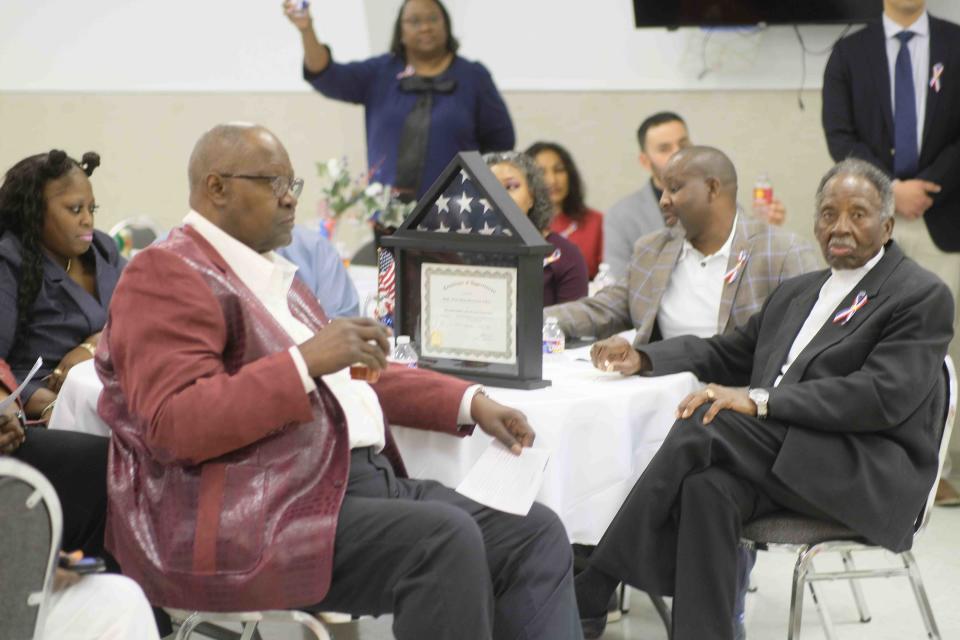Local North Heights veteran reflects on his service
- Oops!Something went wrong.Please try again later.
During the Veterans Day weekend, the United Citizen’s Forum honored Edward Owens for his military service during World War II.
Owens, 96, served in the U.S. Army from 1945 to 1947 as an infantry soldier and was stationed in Japan for his entire military career as the U.S. military took control of the country.

Growing up in Clarkesville, Texas, a small city close to the Texas border with Arkansas, Owens grew up in a very remote rural area of the city and, outside of school, he did not have many interactions in the town.
He was drafted in 1945 and was sent to infantry training at Fort McClellan, Alabama, in a U.S. Army that was still segregated, with his only interaction outside of his race being with some of the white leadership within his training company.
Asked how he felt when he got drafted, Owens said that while the thought of being in a war was troublesome, he felt it was a good thing.

"It was a blessing because I had other things on my mind that I was not going back to school; I just had not told anybody yet,” Owens said.
Owens said that training was very difficult, with being told what to do all the time.
“It was tough for me when I was in training; I had to do whatever they wanted me to do,” Owens said. “I did a lot of shooting, crawling under gunfire and a lot of marching. At the time, we did a lot of things that I thought were unnecessary, but we had no choice.”
He said that they did training with gunfire while training in trench warfare and even learning to take down a plane with gunfire.
After his military training, Owens and his unit were scheduled to deploy to Japan while the war continued. The war ended before his unit was to leave, but he was still sent to Japan during the U.S. military occupation after Japan surrendered.
He said that his unit was stationed in a town called Aomori, where he and his fellow troops were housed in an old building bombed so heavily that it had no roof and was crowded with Black soldiers. He said that his main responsibility during his time in Japan was driving a cargo truck.
He said during most of his time in Japan, there was no interaction between the soldiers and the Japanese people. There was also no intermixing of Black and white soldiers, and he had no interactions outside of his race with other soldiers.
During Owens' training in Alabama and his mission in Japan, the U.S. Army still segregated Black and white service members. Owens said there was almost no dealing with white troops during his time in the military. During military training, they were under the leadership of white soldiers, but during his time in Japan, all his immediate leadership was Black.
Owens said that during his time in Japan, he had more freedom as a Black man than he had ever experienced in the U.S., since he really did not have all the deal with all the issues of segregation that were a daily thing. He said it gave him more of a perspective of having more freedom, even within the confines of being in the military. Owens said Black soldiers outside of work were left alone and had more freedom than they had experienced in the states.
Growing up in a rural area, Owens said his interactions were limited outside of his race except when he was going to a store. He grew up in a time when he had to make a lot of allowances to others due to his race as far as maybe having to wait until after white customers were served.
Once he was given his discharge from the military, he did not want to go back to school because he thought he would be too far behind his classmates. He took some of the money the military had given him and took up a cooking trade when he got out. He did not find any work as a cook, but got a job in a defense factory near his town.
“I never got to use the skills I learned, because when I got to work for the government, they were paying me well, so I didn’t really need that skill,” Owens said.
Owens said he made good money working for the plant, but under President Eisenhower, the plant was closed like many were across the country after the war. After his plant closed, he ended up moving to Amarillo, going from job to job.
He said that he went to places to use his skills as a cook, but only certain jobs were available.
“I went to places to cook, but the only jobs offered were being a fry cook. I could not make a living off of $25 per week,” Owens said.
He said the lack of jobs available to him in the area made it very difficult for him to make enough money. Owens finally caught a break and got offered a job at Gunn Brothers Stamp store in Amarillo. He washed cars for three days at the store, and he said the boss of the store came up to him as he got off the bus for work and said you are not going to do this anymore. The boss said he was better suited for other work.
Owens said he was given an opportunity to oversee five women in a local store. He said his boss said to take the store's catalog home to study. Owens said that he took that book home and studied the sequence of numbers so well that he understood all the pricing of items in the store. Owens said that his knowledge of the merchandise and tags was so good that he could easily recognize if a customer had switched tags to try to pay less for an item with fewer stamps.
These stamps were earned when people bought gas at select stores, and he worked at the store until it closed permanently.
He worked at the stamp store in that position until it closed. Owens said that he moved to Amarillo for a chance to be able to support his wife, Marcelina Owens and his kids. He was married for more than 30 years, and had a second marriage to Anna Fae Owens for more than 20 years.
Asked about how he felt about his time in the military, Owens reflected favorably on his service.
“I was proud that I had the opportunity to serve my country,” Owens said. “This experience grew me up into manhood and helped to make me into a family man.”
He said that his experience made it easier for him to be able to deal with the issues that segregation in the country thrust upon him.
“I always wanted to be independent and did not want to ruin my reputation of being who I was as a man,” Owens said. “Being in the military was the best thing that ever happened to me. It gave me the discipline that I was able to make use of in my own life. I learned a lot about taking care of myself as a man.”
Owens is a well-respected member of the Amarillo community and was looked up to due to his work with the stamp store. He has three living kids, George, Lucretia and Rodney.
“My dad taught me a lot about being a man and taking responsibility in life; I am proud of the service that he did for the country," Rodney Owens said.
This article originally appeared on Amarillo Globe-News: Local North Heights veteran reflects on his service

